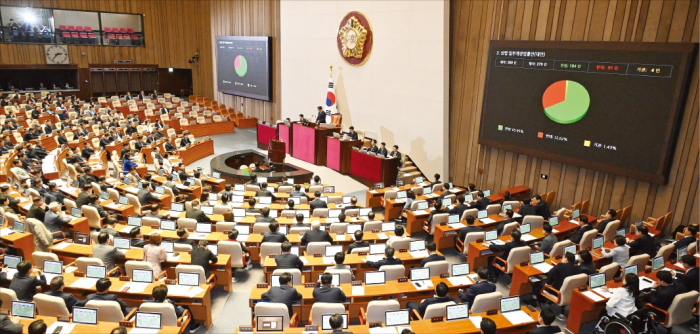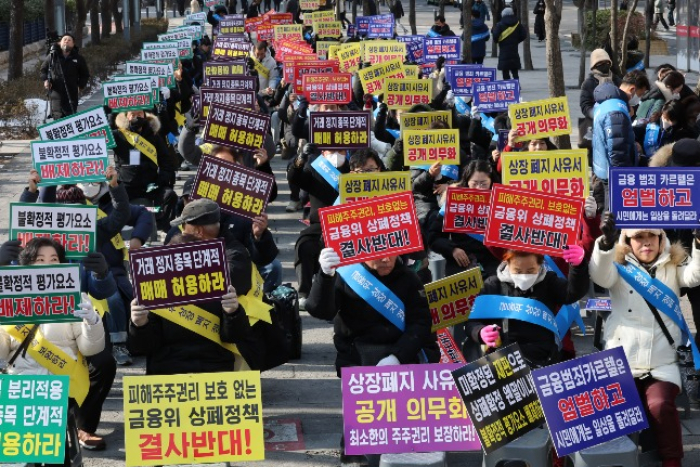Parliament passes bill to expand boards’ fiduciary duties
Acting President and Finance Minister Choi Sang-mok is widely expected to veto the legislation
By Mar 13, 2025 (Gmt+09:00)
LG Chem to sell water filter business to Glenwood PE for $692 million


KT&G eyes overseas M&A after rejecting activist fund's offer


Kyobo Life poised to buy Japan’s SBI Group-owned savings bank


StockX in merger talks with Naver’s online reseller Kream


Meritz backs half of ex-manager’s $210 mn hedge fund



South Korea's National Assembly on Thursday passed an amendment to the Commercial Act to expand boards of directors’ fiduciary duties to minority shareholders.
The move drew strong criticism from business leaders, who warn it would expose more companies, especially smaller ones, to management disputes and foster a risk-averse culture.
Despite opposition from the ruling People Power Party, the liberal Democratic Party, which holds a parliamentary majority, pushed ahead with the bill.
It added a clause that requires directors to fulfill their fiduciary obligations in the best interest of shareholders. Under the current law, the duties apply only to the companies themselves.
Given the potential ramifications of the new law, Acting President and Finance Minister Choi Sang-mok is widely expected to veto the bill.
The Korea Chamber of Commerce and Industry (KCCI) and the Federation of Korean Industries – the country’s two main business lobby groups – urged Choi to reject the amended bill.
However, the Democratic Party could revisit the bill if impeached President Yoon Suk Yeol is removed from office by a Constitutional Court ruling expected this month.

KOREA DISCOUNT
Thus, the legislation addresses the Korea Discount – the persistent undervaluation of South Korean companies relative to their intrinsic values, the Democratic Party added.
But large business owners warn it could leave them more vulnerable to legal action from individual shareholders alleging neglect of duty if their share prices fall.
They could face not only liability for damages but also criminal charges for breach of trust under the legislative measure if an M&A goes awry.
"Given that all new businesses and M&As cannot guarantee success, the new law will create a risk-averse culture," said the chief executive officer of a South Korean business group.
"It will lead to a decline in corporate value over the long term, rather than tackling the Korea Discount," he added.
Developed countries such as the US, the UK, France, Germany and Japan have no laws explicitly requiring board members to act in the best interest of shareholders.

The legislative move comes as activist funds are exercising ever-increasing clout over critical corporate decisions, pressuring companies to prioritize short-term profits over investments in new growth areas.
With the ascent of local activist funds and private equity firms, an unprecedentedly high number of South Korean corporations have become targets of hostile takeover attempts, or have been embroiled in management disputes over the past two decades.
The number of public disclosures related to fights for management control, including legal battles, reached 315 involving 87 listed companies in 2024, according to the KCCI.
In terms of the number of disclosures, 2024 saw the highest in five years.

REVISION INSTEAD TO CAPITAL MARKETS ACT?
Other companies spun off lucrative businesses into separate entities and listed the spin-offs on the stock exchange, a move seen aimed at raising fresh capital.
However, business leaders argued that those issues could be addressed by amending the Capital Markets Act, rather than revising the Commercial Act.
Reflecting this advice, the conservative ruling party proposed adding provisions to the Capital Markets Act that companies must endeavor to protect shareholders’ rights during mergers or business spin-offs.
Also, the People Power Party suggests that companies spinning off some businesses and re-listing on the domestic stock market allocate 20% of their floated shares to the original company shareholders.
"The Capital Markets Act applies only to around 2,600 companies listed on the domestic stock market. But the Commercial Act applies to one million companies, regardless of listing status, leading to criticism that it constitutes 'excessive legislation,'" said a domestic company official.
Write to Bo-Hyung Kim and Jeong-Soo Hwang at Kph21c@hankyung.com
Yeonhee Kim edited this article.
-
 Mergers & AcquisitionsMBK's fight for Korea Zinc control drags on after court ruling
Mergers & AcquisitionsMBK's fight for Korea Zinc control drags on after court rulingMar 07, 2025 (Gmt+09:00)
2 Min read -
 Leadership & ManagementSmall firms emerge as prime targets of management disputes in Korea
Leadership & ManagementSmall firms emerge as prime targets of management disputes in KoreaFeb 10, 2025 (Gmt+09:00)
2 Min read -
 Mergers & AcquisitionsMBK’s Korea Zinc bid aimed at corporate governance, shareholder value
Mergers & AcquisitionsMBK’s Korea Zinc bid aimed at corporate governance, shareholder valueNov 05, 2024 (Gmt+09:00)
2 Min read -
 Shareholder activismAlign Partners calls on Doosan Bobcat to boost shareholder value
Shareholder activismAlign Partners calls on Doosan Bobcat to boost shareholder valueOct 18, 2024 (Gmt+09:00)
2 Min read -
 Leadership & ManagementCorporate management disputes spring up in S.Korea
Leadership & ManagementCorporate management disputes spring up in S.KoreaOct 14, 2024 (Gmt+09:00)
4 Min read -
 Mergers & AcquisitionsDoosan Bobcat scraps merger with Doosan Robotics
Mergers & AcquisitionsDoosan Bobcat scraps merger with Doosan RoboticsAug 29, 2024 (Gmt+09:00)
1 Min read -
 Shareholder valueKorea to put poison pill adoption on new policy agenda
Shareholder valueKorea to put poison pill adoption on new policy agendaJun 14, 2024 (Gmt+09:00)
2 Min read -

-
 Corporate governanceActivist fund steps up pressure for SM Ent's governance reform
Corporate governanceActivist fund steps up pressure for SM Ent's governance reformAug 18, 2022 (Gmt+09:00)
1 Min read -
 RegulationsKorea’s commercial law revisions irk businesses, limit top shareholders’ clout
RegulationsKorea’s commercial law revisions irk businesses, limit top shareholders’ cloutDec 10, 2020 (Gmt+09:00)
3 Min read


